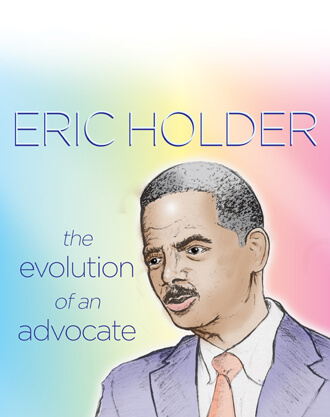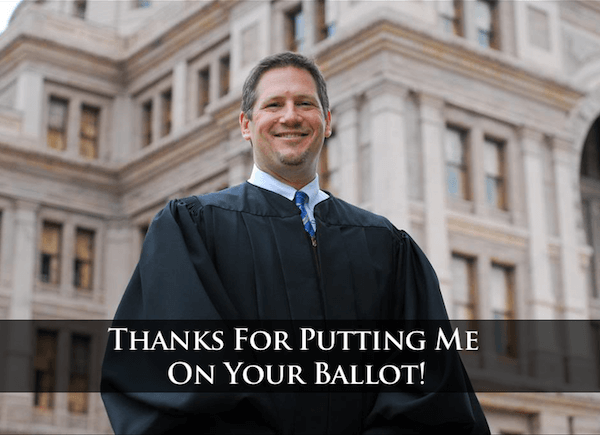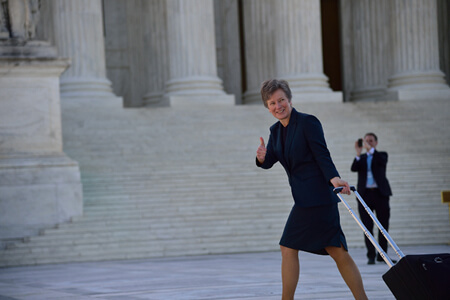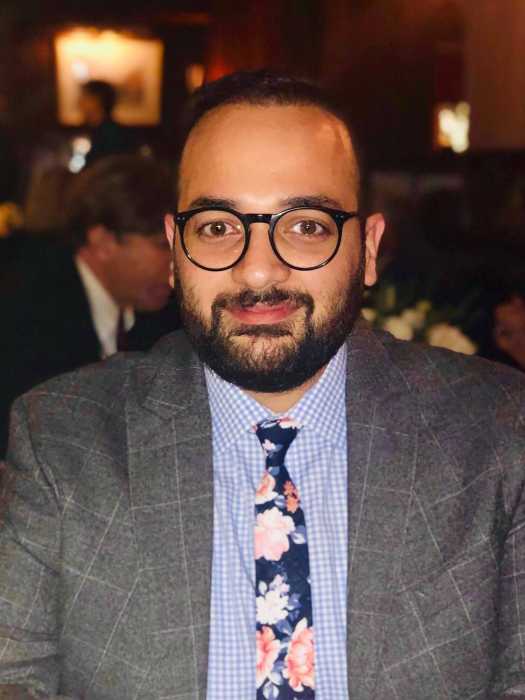Attorney General Eric Holder. | MICHAEL SHIREY
BY PAUL SCHINDLER: It’s rare for there to be much public discussion of any kind about the details of a government filing in a civil lawsuit, so the outrage that erupted over a 2009 Department of Justice brief submitted in litigation over the federal Defense of Marriage Act (DOMA) was something quite extraordinary.
“Holy cow,” John Aravosis wrote on Americablog. “Obama invoked incest and people marrying children.”
Andrew Sullivan was similarly stunned.
“To file an actual brief re-stating some of the worst and most denigrating arguments against gay civil equality is just bizarre,” he wrote on his Daily Dish blog. “What they did — without any heads up to any of their gay supporters and allies — is unconscionable. Citing incest precedents? Calling gay couples free-loaders? Arguing that our civil rights are not impinged because we can marry someone of the opposite sex? Who on earth decided that that was a great idea?”
Coming less than six months after Barack Obama assumed the presidency on a promise to repeal DOMA, the brief unleashed a wave of “we’ve been had” recrimination against the new administration. Even the most sober assessments of the brief characterized it as inartful and politically inept.
The president, according to Jo Becker’s “Forcing the Spring,” a chronicle of the Proposition 8 case, was angered when he learned about the brief and demanded an explanation.
It’s hard to imagine that the explosion of criticism didn’t embarrass, as well, the new attorney general, the first African-American to hold that post and somebody with a deep attachment to the legacy of the Civil Rights Movement, somebody who regards Robert F. Kennedy, the attorney general in his brother’s administration, as his hero, and somebody who as deputy attorney general in the late 1990s was the Clinton administration’s leading advocate for federal hate crimes legislation.
As Holder prepares to leave the Justice Department after nearly six years on the job, he is pledging that should the Supreme Court take up one of the marriage equality cases in the term that begins next week, “we will file a brief that is consistent with the actions that we’ve taken in the past couple of years.” In July, he told ABC’s Pierre Thomas that DOJ has worked hard to make “the promise of the Windsor decision [that last year struck down DOMA] real” and that he had recently sent a letter to Obama detailing the steps taken “to knock down the barriers that still exist for same-sex married couples.”
At a February Human Rights Campaign dinner at the Waldorf Astoria, the attorney general said the issue was “a top priority” for the president and himself and vowed, “In every courthouse, in every proceeding, and in every place where a member of the Department of Justice stands on behalf of the United States — they will strive to ensure that same-sex marriages receive the same privileges, protections, and rights as opposite-sex marriages under federal law.”
But Holder’s record on same-sex marriage began with the June 2009 brief — and it was an inauspicious start. Portions of the brief read to many as inflammatory — and occasioned the greatest and easiest outrage. In rebutting the plaintiffs’ claim that the portion of DOMA that allows states to deny recognition to legal same-sex marriages from other states violates the US Constitution’s Full Faith and Credit Clause, DOJ cited court precedents that upheld the rights of states to refuse recognition to marriages from elsewhere at odds with their own age of consent laws and their restrictions on marriage by cousins too closely related. That passage led to the anger over “incest” and “people marrying children.”
Other portions of the 2009 brief seemed disingenuous. Aravosis noted that when asked to comment on criticism aimed at the brief, the administration emphasized the difference between Obama’s policy preferences and his DOJ’s legal arguments, saying, “The president has said he wants to see a legislative repeal of the Defense of Marriage Act because it prevents LGBT couples from being granted equal rights and benefits.” But that gulf was unbridgeable, Aravosis argued, given that the DOJ brief stated, “DOMA does not discriminate against homosexuals in the provision of federal benefits.”
That sentence from the brief was the one that most infuriated Chris Geidner, now the legal editor at BuzzFeed and among the closest observers of the courtroom twists and turns on the path to marriage equality.
Gay City News’ Arthur S. Leonard, a New York Law School professor, was struck by what he and others termed a “new argument” — one that was not made during the 1996 congressional debate over DOMA and therefore one that could not now post-facto be described as a rational basis for its enactment.
“The one that bothers me the most,” Leonard wrote here, “is the argument that there is no anti-gay motivation behind DOMA, merely a desire by Congress to pursue a policy of ‘neutrality’ with respect to the issue of same-sex marriage in a situation where some states allow such marriages while others bar them. This is absurd.”
The negative fallout had at least some impact on the administration and the legal arguments it put forward. Over the next 18 months, the legal wordsmiths at DOJ took some pains to apply lipstick — but the pig proved no shape-shifter. In early 2011, when DOJ prepared for its appeal of a district court ruling out of Boston that held DOMA did not satisfy even the most lenient standard of judicial review — that it was grounded in some conceivably rational basis — it was still peddling the same “neutrality” argument, saying that the status quo of federal uniformity was required as the states, one by one, wrestled with the question of gay marriage.
Edie Windsor’s challenge to DOMA in the New York Southern District court provided Holder and Obama with an out, one it seems clear they had been casting about for. Arguing a case in New York, which is located in the Second Federal Circuit, offered opportunities not available in Boston, which is in the First Circuit. Under governing precedent in the First Circuit, claims of sexual orientation do not merit heightened scrutiny. The government need merely show it has a rational basis for a policy under challenge — a very deferential standard that does not require the motivation to be compelling or the solution narrowly tailored. The president and the attorney general were not prepared to argue in Boston that no rational basis existed for DOMA.
In contrast with the First Circuit, the New York-based Second Circuit had established no precedent on the appropriate level of scrutiny that should be applied when sexual orientation claims are made. In that sense, it was legally terra nova and the administration undertook an examination of what level of scrutiny it believed was appropriate.
The result of that analysis proved groundbreaking. In a February 2011 letter, Holder informed House Speaker John Boehner, an Ohio Republican, that DOJ would not defend DOMA in the Windsor case.
“After careful consideration, including a review of my recommendation, the president has concluded that given a number of factors, including a documented history of discrimination, classifications based on sexual orientation should be subject to a more heightened standard of scrutiny,” the attorney general wrote. “The president has also concluded that Section 3 of DOMA, as applied to legally married same-sex couples, fails to meet that standard and is therefore unconstitutional.”
DOJ took its new posture a step further in July of 2011 when it filed a brief in support of a suit brought by a federal court employee, Karen Golinski, challenging the denial of spousal benefits to her wife. Legal commentators termed the brief a “game changer,” with the administration shifting from a posture of not defending DOMA to one where it was working to undo it.
In New York, Windsor went on to win her case at the district court, and when the Second Circuit ruled on the appeal brought by a legal team representing the House Republicans, it followed the lead of the First Circuit in Boston in striking down DOMA — but it did so with a more powerful vindication of gay rights.
“What is different about this decision is the court’s conclusion that the ‘heightened scrutiny’ test should be used to decide the case,” Gay City News’ Leonard wrote at the time. “This could make the Second Circuit the first federal circuit to adopt this more searching standard for evaluating claims of sexual orientation discrimination under the constitutional guarantee of equal protection.”
By the time the Second Circuit, in October 2012, had ruled in Edie Windsor’s case, Obama had made his long-awaited embrace of gay marriage. Welcome as the president’s May 2012 comments were, they had their limitations.
“At a certain point I’ve just concluded that for me personally it is important for me to go ahead and affirm that I think same sex-couples should be able to get married,” Obama told Robin Roberts in an interview on ABC.
He did not, however, take the next step of saying there is a federal constitutional right to marry. In fact, he suggested otherwise.
“I have to tell you that part of my hesitation on this has also been I didn’t want to nationalize the issue,” the president told Roberts. “There’s a tendency when I weigh in to think suddenly it becomes political and it becomes polarized. And what you’re seeing is, I think, states working through this issue — in fits and starts, all across the country. Different communities are arriving at different conclusions, at different times. And I think that’s a healthy process and a healthy debate. And I continue to believe that this is an issue that is gonna be worked out at the local level, because historically, this has not been a federal issue, what’s recognized as a marriage.”
From then until the critical moment 13 months later when the Supreme Court struck down DOMA’s ban on federal recognition of legal same-sex marriages while letting stand a lower court ruling tossing out California’s Proposition 8, DOJ’s posture did not vary from the ground staked out by Obama.
In one sense, the administration was doing what it could to support the plaintiffs litigating these cases — but going no further. Windsor did not need the high court to find a federal right to marry in order to have the IRS’ refusal to have her marriage recognized in a dispute over inheritance taxes on her late wife’s estate struck down. And as it turned out, the Prop 8 litigants were able to win back the right to marry in California without the Supreme Court deciding the underlying constitutional question — or even weighing in on the merits of the case at all.
But DOJ did do more than the minimum. The federal government was not a party to the Prop 8 litigation, which was a challenge to the constitutionality of a state voter initiative. But LGBT advocates pressed hard for the administration to weigh in and it did. In a brief filed about a month before the Supreme Court heard arguments on Prop 8, DOJ used the heightened scrutiny standard to argue that when California voters took away a right that state’s Supreme Court had earlier granted, they violated the equal protection rights of same-sex couples there.
That argument would seem narrowly tailored to the particular circumstances of California, where couples were able to marry between May and November 2012 before that right was taken away. Arthur S. Leonard, however, noted that the filing was “a subtly constructed brief,” one that essentially argued that any state that offers same-sex couples all the rights and benefits of marriage but not the title — as a number of states then did with civil union or comprehensive domestic partnership laws — were violating their equal protection rights.
“The government’s brief does not overtly advocate that same-sex couples have a federal constitutional right to marry as such,” Leonard noted here. “Rather, it asserts that if a state has resolved the policy issues in favor of providing the rights, benefits, and responsibilities of marriage to same-sex couples, it cannot then deny them the right to marry.”
Leonard also discerned more comprehensive implications in the DOJ posture.
“The arguments it makes could well support a challenge against a state Defense of Marriage Act or the failure of a state to provide marriage — whether or not the state has adopted civil unions — by arguing against the sorts of constitutional justifications advanced to defend Prop 8,” he wrote.
The Supreme Court may well have wondered about those same subtleties in the administration’s posture. As BuzzFeed’s Geidner recently noted, Chief Justice John Roberts essentially called the administration’s bluff during the Prop 8 arguments, asking Donald Verrilli, Jr., the solicitor general who was representing DOJ, “Is it the position of the United States that same-sex marriage is not required throughout the country?”
Verrilli gave the answer that may strategically have been the best one to help the cause of the Prop 8 plaintiffs, but he also pulled back from having the administration go the full distance.
“We are not taking the position that it is required throughout the country,” he responded. “We think that that ought to be left open for a future adjudication in other states that don’t have the situation California has.”
Cautious restraint may be a fair characterization of how DOJ lent its voice to the plaintiffs challenging Prop 8 and DOMA, but its response to the June 2013 Supreme Court ruling tossing out the ban on federal recognition of valid same-sex marriages was anything but restrained. Obama, in-flight when the ruling came down, called Windsor from Air Force One to congratulate her and promptly issued a statement directing Holder “to work with other members of my Cabinet to review all relevant federal statutes to ensure this decision, including its implications for federal benefits and obligations, is implemented swiftly and smoothly.”
By the time the Human Rights Campaign held its press conference that day, Holder had already chatted with the group’s president, Chad Griffin, to discuss what Griffin characterized as “an expedited implementation of the DOMA ruling.”
True to Holder’s word, the administration in fact acted with alacrity in tackling what was a big task — figuring out how to conform federal government practice with the mandate that same-sex couples have their marriages recognized. One of the thorniest issues was how to treat those couples who married in states where it was legal, but lived in states where it was not. Here, the administration tilted decisively toward a maximalist position.
On June 28, two days after the high court ruling, the US Office of Personnel Management issued a directive that same-sex spouses of federal government employees would be eligible for spousal benefits wherever they lived. On July 1, Janet Napolitano, then the secretary of Homeland Security, directed the immigration service to review all visa petitions and treat same-sex spouses in the same manner as different-sex spouses, again regardless of where they lived. Less than three weeks later, the Board of Immigration Appeals, a unit of the Justice Department, announced that it too would consider where a marriage was celebrated rather than where a couple lived in petitions for lawful resident status by same-sex couples where one partner was not a US citizen.
Perhaps the most significant advance came in late August of 2013 when Treasury Secretary Jack Lew announced that the IRS would treat every married same-sex couple in the nation as such for federal income tax purposes. A few days later, Holder wrote to Boehner telling him that despite the fact that the DOMA ruling did not specifically address a law barring the Defense Department and Veterans Administration from providing same-sex spousal benefits, “the reasoning of the opinion strongly supports the conclusion that those provisions are unconstitutional.”
By the start of this year, it had become routine for the administration and DOJ, in particular, to react to new questions about federal recognition by stepping up with solutions. After roughly 1,300 couples married in Utah between the time a federal judge struck down that state’s gay marriage ban on December 20 and the Supreme Court stepped in to stay the ruling on January 6, Republican Governor Gary R. Herbert directed Executive Branch officials there not to honor those marriages while an appeal was undertaken. Several days later, Holder announced the federal government would take the opposite approach.
DOJ, he said in a release, “has been working tirelessly to implement [the DOMA ruling] in both letter and spirit — moving to extend federal benefits to married same-sex couples as swiftly and smoothly as possible.” As the appeals process plays out, he added, “these marriages will be recognized as lawful and considered eligible for all relevant federal benefits on the same terms as other same-sex marriages. These families should not be asked to endure uncertainty regarding their status as the litigation unfolds.”
In what the administration billed as a major policy pronouncement in early February, Holder in his Waldorf speech to the HRC, announced new DOJ policies to advance the compliance required by last June’s high court ruling. At the February 8 dinner, the attorney general said that members of same-sex couples will have the right to decline testifying against their spouse in criminal and civil court proceedings, they will be treated just like different-sex couples in bankruptcy proceedings, inmates will be eligible for spousal visits from a same-sex spouse and have the right to furloughs for a spousal emergency or death, and same-sex spouses will be able to participate in federal benefit programs such as the September 11th Compensation Fund and the Public Safety Officers’ Benefits Program, which grants compensation after the injury or death of a police officer or fire fighter.
Holder spoke in ringing tones and DOJ leaked the substance of the speech to the New York Times hours before its delivery, but the attorney general was doing nothing fundamentally different than he had been for seven months — moving as expeditiously and with as high a profile as possible to ensure compliance across the federal government.
With Holder’s departure on the horizon, what remains undone in his advocacy and that of his boss, the president, is an unambiguous embrace of a federal constitutional right to marry for same-sex couples. The attorney general’s comments to ABC in July and NBC in the past week suggest clearly that DOJ is ready to take that step. Twice, Holder pledged to file a brief in any Supreme Court litigation and characterized the arguments the administration would make as “consistent” with their past actions.
Not surprisingly, perhaps, given the venue of a television interview, he did not make clear precisely what that pledge would mean in terms of specific arguments, though he did tip his hand in July when he told ABC, “I think that a lot of these measures will not survive a heightened scrutiny examination.”
Holder has said he will stay on the job until his successor is confirmed by the Senate — something that could take some time given the November elections and the harsh partisan climate on Capitol Hill. With the Supreme Court positioned to accept one or more of the cases that resulted in pro-marriage equality rulings at the appellate level, Holder may have the chance to complete his journey as an advocate and file the brief that puts the United States government squarely behind the constitutional right of every same-sex couple in America to marry.






































